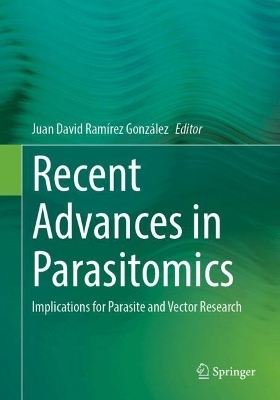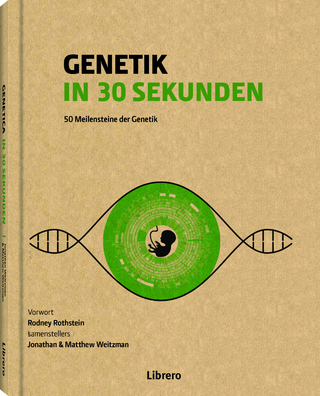
Recent Advances in Parasitomics
Springer International Publishing (Verlag)
978-3-031-70590-8 (ISBN)
- Noch nicht erschienen - erscheint am 26.01.2025
- Versandkostenfrei innerhalb Deutschlands
- Auch auf Rechnung
- Verfügbarkeit in der Filiale vor Ort prüfen
- Artikel merken
This book presents a new era in parasitology research and involves several contributions on translational results. Readers are equipped with the recent advances of parasitomics (the OMICS study of parasites). World-renowned experts in the field of molecular biology and omics provide a glance of how omics have revolutionized our understanding of parasites and vectors, including the implications of these advances. A particular focus is on comprehending the biology, diagnostics, surveillance, response to treatment, prevention, and control of parasites. Final, cutting-edge studies on disease vectors round out this volume. Overall, five thematic book sections provide a clear overview and smooth findability of contents.
Parasitic diseases represent an important burden for healthcare systems, particularly in endemic countries. In recent decades, there have been several advances in dissecting the genome, transcriptome and proteome of parasites allowing researchers worldwide to exploit this information and ameliorate our understanding of parasitoses and infections.
For the first time, this collection will permit scientists, students, and all medical professionals around the world to update their knowledge and uncover the impact of going from basic science to implementation in order to mitigate parasitic diseases. In this way, the present work makes an indispensable contribution to practical progress regarding research on Neglected Tropical Diseases (NTDs) and the Sustainable Development Goal (SDG) 2, Good Health and Well-Being.
Juan David Ramírez González, PhD, is Full Professor at the Universidad del Rosario in Bogota, Colombia. As head and founder of the Research Center of Microbiology and Biotechnology, he created an excellence research hub for Biology and Medicine students focused on Molecular Diagnostics, Molecular Epidemiology and Comparative Genomics of parasitic and viral diseases. Moreover, Juan David is the Assistant Director of the Molecular Microbiology Laboratory at the Mount Sinai Health System and Associate Professor at the Department of Pathology, Molecular and Cell-based Medicine from the Icahn School of Medicine at Mount Sinai, New York, USA.
The current research interest of Professor Ramírez-González is to develop and validate novel tools for the detection and real time surveillance of endemic and emerging pathogens using cutting-edge diagnostic platforms (i.e., Next Generation Sequencing). His research plan as independent researcher is evidenced in more than 280 peer-reviewed manuscripts in international journals with an h-index of 50. Juan David has dedicated the last 15 years of his career tracking the dispersal and evolution of Trypanosoma cruzi, intestinal parasites (Giardia, Cryptosporidium and Blastocystis), Leishmania, Dengue virus, and recently due to the COVID-19 pandemic the SARS-CoV-2 and Monkeypox virus (MPXV).
Part I: Trypanosomatids.- Deployment Of Amplicon-Based Sequencing Platforms Using Oxford Nanopore Technologies For The Detection And Surveillance Of Trypanosomatids.- Proteomics Of Leishmania Parasites.- Decoding Chagas Disease: What Next-Generation Sequencing Has Taught Us.- Crispr-Cas In Parasites: Advances And Challenges In The Study Of Neglected Tropical Diseases.- Part Ii: Intestinal Parasites.- Blastocystomics.- Where Is Cryptosporidium Population Genomics Going Next - The Challenge And The Promise.- Deep Sequencing Applications For Intestinal Parasite Detection And Differentiation.- Part Iii: Apicomplexans.- Advances In Toxoplasma Functional Genomics.- Toxoplasma Gondii's Endo-Symbionts: An Insight Into Their Genomic Secrets.- Cyclospora Comparative Genomics.- An Overview Of Babesia Species Biology Based On Omics Studies.- Part Iv: Helminths.- From Genes To Worms: A Deep Dive Into Helminth Omics.- Understanding The Extracellular Vesicles In Helminths.- Recent Advances In Parasitomics: Omics In The Study Of Ascariasis.- Part V: Vectors.- Genomics Of Triatominae, The Chagas Disease Vectors.- Studying The Interactions Between Microbiomes And Leishmania Parasites In Sandflies: A Source Of New Targets For Pathogen Control.
| Erscheint lt. Verlag | 26.1.2025 |
|---|---|
| Zusatzinfo | X, 395 p. 46 illus., 42 illus. in color. |
| Verlagsort | Cham |
| Sprache | englisch |
| Maße | 155 x 235 mm |
| Themenwelt | Naturwissenschaften ► Biologie ► Genetik / Molekularbiologie |
| Naturwissenschaften ► Biologie ► Mikrobiologie / Immunologie | |
| Schlagworte | CRISPR-Cas • Deep sequencing • genomics • Good health and well-being • helminths • neglected tropical diseases • Next-generation sequencing • Omics • parasite • Parasite genome • Parasite Vector • Proteomics • Protozoa • SDG 3 • Sustainable Development Goal • Transcriptomics |
| ISBN-10 | 3-031-70590-4 / 3031705904 |
| ISBN-13 | 978-3-031-70590-8 / 9783031705908 |
| Zustand | Neuware |
| Haben Sie eine Frage zum Produkt? |
aus dem Bereich


